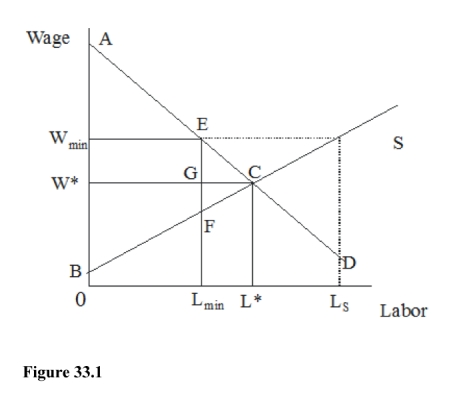Exam 33: Minimum Wage
Exam 1: Economics: the Study of Opportunity Cost124 Questions
Exam 2: Supply and Demand204 Questions
Exam 3: The Concept of Elasticity and Consumer and Producer Surplus173 Questions
Exam 4: Firm Production, Cost, and Revenue158 Questions
Exam 5: Perfect Competition, Monopoly, and Economic Versus Normal Profit119 Questions
Exam 6: Every Macroeconomic Word You Ever Heard: Gross Domestic Product, Inflation, Unemployment, Recession, Depression201 Questions
Exam 7: Interest Rates and Present Value118 Questions
Exam 8: Aggregate Demand and Aggregate Supply110 Questions
Exam 9: Fiscal Policy66 Questions
Exam 10: Monetary Policy104 Questions
Exam 11: Federal Spending76 Questions
Exam 12: Federal Deficits, Surpluses, and the National Debt76 Questions
Exam 13: The Housing Bubble71 Questions
Exam 14: The Recession of 2007-2009: Causes and Policy Responses57 Questions
Exam 15: Is Economic Stagnation the New Normal42 Questions
Exam 16: Is the Fiscalsky Falling: An Examination of Unfunded Social Security, Medicare, and State and Local Pension Liabilities51 Questions
Exam 17: International Trade: Does It Jeopardize American Jobs86 Questions
Exam 18: International Finance and Exchange Rates77 Questions
Exam 19: The European Debt Crisis60 Questions
Exam 20: Economic Growth and Development60 Questions
Exam 21: Nafta, Gatt, Wto: Are Trade Agreements Good for Us42 Questions
Exam 22: The Line Between Legal and Illegal Goods71 Questions
Exam 23: Natural Resources, the Environment, and Climate Change73 Questions
Exam 24: Health Care87 Questions
Exam 25: Government-Provided Health Insurance: Medicaid, Medicare, and the Child Health Insurance Program79 Questions
Exam 26: The Economics of Prescription Drugs62 Questions
Exam 27: So You Want to Be a Lawyer: Economics and the Law62 Questions
Exam 28: The Economics of Crime62 Questions
Exam 29: Antitrust39 Questions
Exam 30: The Economics of Race and Discrimination60 Questions
Exam 31: Income and Wealth Inequality70 Questions
Exam 32: Farm Policy63 Questions
Exam 33: Minimum Wage60 Questions
Exam 34: Ticket Brokers and Ticket Scalping60 Questions
Exam 35: Rent Control31 Questions
Exam 36: Economics of K-12 Education55 Questions
Exam 37: Economics of College and University Education82 Questions
Exam 38: Poverty and Welfare69 Questions
Exam 39: Head Start44 Questions
Exam 40: Social Security60 Questions
Exam 41: Personal Income Taxes55 Questions
Exam 42: Energy Prices67 Questions
Exam 43: If We Build It, Will They Come and Other Sports Questions61 Questions
Exam 44: The Stock Market Crashes57 Questions
Exam 45: Unions66 Questions
Exam 46: Walmart: Always Low Prices and Low Wages- Always41 Questions
Exam 47: The Economic Impact of Casino Gambling39 Questions
Exam 48: The Economics of Terrorism43 Questions
Select questions type
Those that gain from an increase in the minimum wage are
Free
(Multiple Choice)
4.8/5  (35)
(35)
Correct Answer:
B
The majority of minimum wage workers are
Free
(Multiple Choice)
4.9/5  (38)
(38)
Correct Answer:
B
It is generally true that massive increases in the minimum wage help workers that keep their jobs more than it hurts workers that lose their jobs.
Free
(True/False)
4.8/5  (34)
(34)
Correct Answer:
False
If an increase in the minimum wage increases workers' incomes by $75 and reduces employers' incomes by $100, while workers' spend all of their income increase but employers reduce their spending by only eighty percent of their income reduction, aggregate spending
(Multiple Choice)
4.8/5  (41)
(41)
Increases in the minimum wage are in every worker's best interest.
(True/False)
4.9/5  (32)
(32)
 -In Figure 33.1, how many people would lose their jobs as a result of the minimum wage?
-In Figure 33.1, how many people would lose their jobs as a result of the minimum wage?
(Multiple Choice)
4.9/5  (33)
(33)
If you view a dollar's worth of consumer surplus (received by employers)equal to a dollar's worth of producer surplus (received by employees)then the minimum wage usually
(Multiple Choice)
4.9/5  (36)
(36)
A wage sufficient to keep a family out of poverty is called the
(Multiple Choice)
4.8/5  (44)
(44)
If a fast food restaurant was one of many hiring workers, the minimum wage was $7.25 an hour and it was paying $7.25 an hour to new employees. Suppose a worker earns a $0.75 raise to $8 an hour. Now suppose the minimum wage rises to $8.25 an hour. The government requires this worker to be paid
(Multiple Choice)
4.8/5  (44)
(44)
As of June 2013, after two 70-cent increases in recent years, the federal minimum wage was
(Multiple Choice)
4.9/5  (33)
(33)
The "work effort argument" criticizing traditional economic analyses of the minimum wage implies
(Multiple Choice)
4.9/5  (29)
(29)
If a fast food restaurant was one of many hiring workers, the minimum wage was $7.25 an hour and it was paying $7.25 an hour, an increase in market demand so that the new equilibrium was $9.00 per hour would cause them to
(Multiple Choice)
4.8/5  (43)
(43)
The lowest wage that may be legally paid for an hour's work is called the
(Multiple Choice)
4.9/5  (34)
(34)
At $7.25 per hour the 2016 inflation adjusted minimum wage was
(Multiple Choice)
4.7/5  (36)
(36)
It is generally true that modest increases in the minimum wage help workers that keep their jobs more than it hurts workers that lose their jobs.
(True/False)
4.8/5  (36)
(36)
Suppose you were to hear an economist defend the minimum wage on the grounds that she estimated that when she estimated the saving rate of minimum wage workers and found it to be much smaller than the savings rate of employers. You would know her to be relying on the ____ argument.
(Multiple Choice)
4.9/5  (36)
(36)
It is possible to raise the minimum wage so high to hurt workers generally.
(True/False)
4.8/5  (32)
(32)
The minimum wage has never been sufficient to get a family of ____ above the poverty line.
(Multiple Choice)
4.9/5  (39)
(39)
Showing 1 - 20 of 60
Filters
- Essay(0)
- Multiple Choice(0)
- Short Answer(0)
- True False(0)
- Matching(0)